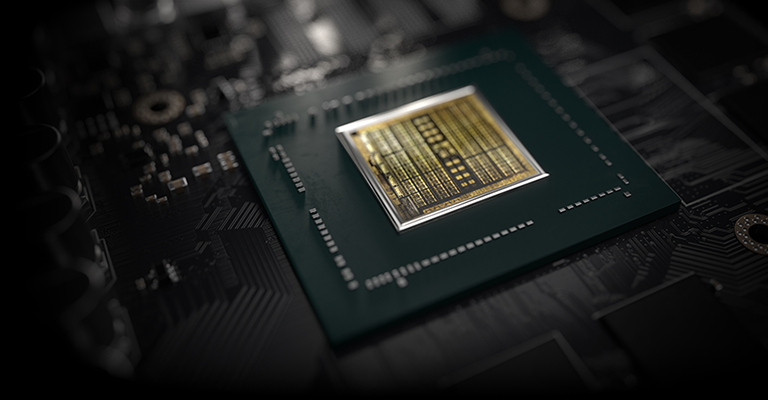
Nvidia is today unveiling the mainstream GeForce GTX 1650 GPU. Based on the new Turing architecture, this time in what the company calls the TU117 die, it's the logical successor to the Pascal-based GeForce GTX 1050 and 1050 Ti from 2016.
This is a strange launch insofar as Nvidia has not provided the press with pre-launch drivers for performance evaluation, even though multiple partners have seeded us boards a while back.
Mainstream GeForce GTX |
||||||||||||
|---|---|---|---|---|---|---|---|---|---|---|---|---|
| GPU | GTX 1660 Ti |
GTX 1660 |
GTX 1650 |
GTX 1060 |
GTX 1050 Ti |
|||||||
| Launch date | Feb 2019 |
Mar 2019 |
April 2019 |
May 2016 |
October 2016 |
|||||||
| Codename | TU116 |
TU116 |
TU117 |
GP106 |
GP107 |
|||||||
| Architecture | Turing |
Turing |
Turing |
Pascal |
Pascal |
|||||||
| Process (nm) | 12 |
12 |
12 |
16 |
16 |
|||||||
| Transistors (bn) | 6.6 |
6.6 |
? |
4.4 |
3.3 |
|||||||
| Die Size (mm²) | 284 |
284 |
? |
200 |
132 |
|||||||
| Base Clock (MHz) | 1,500 |
1,530 |
1,485 |
1,506 |
1,290 |
|||||||
| Boost Clock (MHz) | 1,770 |
1,785 |
1,665 |
1,708 |
1,392 |
|||||||
| Founders Edition Clock (MHz) | - |
- |
- |
1,708 |
- |
|||||||
| Shaders | 1,536 |
1,408 |
896 |
1,280 |
768 |
|||||||
| Peak GFLOPS | 5,437 |
5,027 |
2,984 |
3,855 |
2,138 |
|||||||
| Founders Edition GFLOPS | - |
- |
- |
3,855 |
- |
|||||||
| Tensor Cores | - |
- |
- |
- |
- |
|||||||
| RT Cores | - |
- |
- |
- |
- |
|||||||
| Memory Size | 6GB |
6GB |
4GB |
6GB |
4GB |
|||||||
| Memory Bus | 192-bit |
192-bit |
128-bit |
192-bit |
128-bit |
|||||||
| Memory Type | GDDR6 |
GDDR5 |
GDDR5 |
GDDR5 |
GDDR5 |
|||||||
| Memory Clock | 12Gbps |
8Gbps |
8Gbps |
8Gbps |
7Gbps |
|||||||
| Memory Bandwidth | 288 |
192 |
128 |
192 |
112 |
|||||||
| ROPs | 48 |
48 |
? |
48 |
32 |
|||||||
| Texture Units | 96 |
88 |
? |
80 |
48 |
|||||||
| L2 cache (KB) | 1,536 |
1,536 |
? |
1,536 |
1,024 |
|||||||
| Power Connector | 8-pin |
8-pin |
- |
6-pin |
- |
|||||||
| TDP (watts) | 120 |
120 |
75 |
120 |
75 |
|||||||
| Founders Edition TDP (watts) | - |
- |
- |
- |
- |
|||||||
| Suggested MSRP | $279 |
$219 |
$149 |
$249 |
$139 |
|||||||
| Founders Edition MSRP | - |
- |
? |
$299 |
- |
|||||||
Analysis
We've pieced together some technical information from a communication an hour or so before launch, though it is bereft of the juicier details that enthusiasts like to know and talk about. What we do know is that the TU117 die is home to 896 shaders and has base and boost speeds of 1,485MHz and 1,665MHz, respectively. On the back-end, it is predictably sedate, with 4GB of GDDR5 memory operating at 8Gbps, leading to 128GB/s of bandwidth.
The speeds and feeds still compare well against the GTX 1050 Ti, and Nvidia expects more-than-suggested performance due to the specific enhancements in the Turing architecture - concurrent integer and float instruction capability as well as smarter, deeper caching. The company offers only a single performance metric at launch: that it is 70 per cent faster than a GeForce GTX 1050 at a 1080p resolution.
Another aspect of note is that GTX 1650 is designed for energy efficiency; the reference spec keeps to a 75W TDP, meaning that basic cards won't need an external power connector. You can be sure that certain partners will still stick big-ass coolers and run with a six-pin power connector.
Pricing is set to begin at $149/£138, putting it comfortably below the £200 charged for the GeForce GTX 1660. Of more concern to Nvidia and consumers is how this baby Turing-infused GTX fares against the AMD competition, which right now rests with the cheaper Radeon RX 570 cards out there, also starting at £140.
We will be reviewing the usual bevy of add-in partner cards in due course, but given the specification sheet and price, are you tempted by the sub-£150 GeForce GTX 1650 at the outset?






